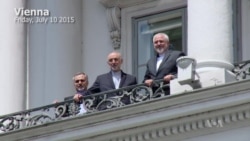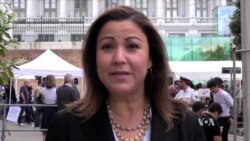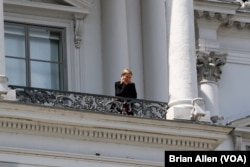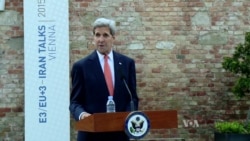An interim nuclear agreement between Iran and world powers will be extended through Monday, to provide negotiators in Vienna more time for talks on a comprehensive deal, a senior U.S. State Department official said Friday.
"To allow for the additional time to negotiate, we are taking the necessary technical steps for the measures of the Joint Plan of Action to remain in place through July 13," the official said.
Later Friday, U.S. Secretary of State John Kerry said progress had been made in negotiations.
"We still have a couple of very difficult issues, and we’ll be sitting down to discuss those in the very near term," Kerry said to reporters as he met with his team in Vienna. "But I think we have resolved some of the things that were outstanding and we’ve made some progress."
WATCH: Mary Alice Salinas reports from Vienna
Kerry met earlier Friday with Iranian Foreign Minister Mohammad Javad Zarif and European Union foreign-policy officials.
An interim nuclear agreement was reached in April and an original June 30th deadline for a final deal has already passed.
Negotiators missed a U.S. congressional deadline Friday, meaning the Republican-led U.S. Congress will now have 60 days, rather than 30, to review a deal, extra time U.S. President Barack Obama's administration worries could derail it.
But talks have been continuing and the foreign ministers involved agreed to reconvene in Vienna Saturday.
"We are making progress, it's painfully slow," British Foreign Secretary Philip Hammond said before leaving Vienna Friday.
Lower-level officials from the U.S., Britain and other participants in the talks are still meeting with Iran's team, Hammond indicated, and said he is confident they will "clear some more of the text."
To regroup
Hammond said he and other foreign ministers would "regroup" in Vienna Saturday "to see whether we can get over the remaining hurdles."
The sides remain divided over issues that include a U.N. arms embargo on Iran, which Western powers want to keep in place; access for inspectors to military sites in Iran, and access to Iran's nuclear scientists to determine whether Tehran conducted research in the past on how to potentially weaponize its nuclear stockpiles.
Signs of strain
However, as the round of talks entered its second week, there were increasing signs of exasperation.
Late Thursday, Zarif late lashed out at “several countries” he said were shifting their positions and making “excessive demands.”
“Such issues have made the negotiations difficult. We want a dignified agreement and negotiations, and we will continue to negotiate. The deal would be within reach should the other side seek an honorable and balanced accord,” Zarif said, according to Iranian state media.
Earlier Thursday, Kerry warned if difficult decisions are not made soon, his negotiators are ready to "end this process."
"We will not rush and we will not be rushed" into reaching an agreement, Kerry told reporters in Vienna.
White House comments
The White House echoed Kerry's comments. "If it becomes clear that Iran is not interested in engaging in a constructive way to try to resolve the remaining sticking points, then the negotiators should come home," said spokesman Josh Earnest on Friday.
On Friday, Congressman Edward Royce, a prominent Republican in the House of Representatives who heads the influential Foreign Affairs Committee, criticized what he has seen from the negotiations to this point.
Although Royce noted there is no agreement yet, he said indications are that Iran will prevail on many of its major demands.
"How is that a deal?" the California congressman asked rhetorically in a television interview.
Western countries accuse Iran of seeking the capability to build nuclear weapons, while Iran has long insisted its nuclear program is solely for civilian purposes, such as medical research and generating power.
William Gallo and Brian Allen contributed to this report. Some material for this report came from AP and Reuters.
WATCH: U.S. Secretary of State John Kerry speaks Thursday









